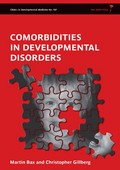Comorbidities in Developmental Disorders
Clinics in Developmental Medicine

1. Edition October 2010
176 Pages, Softcover
Wiley & Sons Ltd
In the last decade the term 'comorbidity' has gained popularity in the field of paediatric neurodisability, with the increasing recognition that many conditions are rarely present in isolation. Within this field, the term is often used to refer to the co-occurrence of conditions more frequently than would be expected by chance, which can include instances where one condition causes the other, where they share a common cause (for example, genetic), or where they are in fact manifestations of a single condition. Whether it is valid to use the term 'comorbidity' in all these situations, and how precisely it should be used, is something that the contributors to this book grapple with in their own fields of interest.
The contributors, all world experts in their fields, also discuss what we can learn from the presence of comorbidities, however defined, about the aetiology and treatment of neurodevelopmental disabilities. In particular, they demonstrate how our increasing understanding of the mechanisms underlying the common association of many 'comorbidities' is helping us to understand the natural history of these conditions and improve our management of them.
Readership
Paediatricians, paediatric neurologists, child psychiatrists, neurodevelopmentalists, and physical, occupational and speech therapists working with children with developmental disabilities.
INTRODUCTION Martin Bax (London, UK) and Christopher Gillberg (Gothenburg, Sweden)
1. INTELLECTUAL DISABILITIES AND THEIR COMBORBIDITIES Jeremy Turk (London, UK)
2. HETEROGENEITY IN CEREBRAL PALSY: VARIATIONS IN NEUROLOGY, COMORBIDITY AND ASSOCIATED CONDITIONS J. Keith Brown (Edinburgh, UK), Paul Eunson (Edinburgh, UK) and Martin Bax (London, UK)
3. GILLES DE LA TOURETTE SYNDROME AND ITS COMMON COMORBIDITIES Michael Orth (Ulm, Germany) and Mary May Robertson (London, UK)
4. COMORBIDITY IN NEURODEVELOPMENTAL DISORDERS: THE CASE OF ATTENTION-DEFICIT-HYPERACTIVITY DISORDER Eric Taylor (London, UK)
5. EARLY LANGUAGE DISORDER AS A FREQUENT COMORBIDITY IN MANY DEVELOPMENTAL DISORDERS IN YOUNG CHILDREN Isabelle Rapin (Bronx, NY, USA)
6. AUTISM AND EPILEPSY: COMORBIDITY, COEXISTENCE OR COINCIDENCE? Christopher Gillberg (Gothenburg, Sweden) and Brian Neville (London, UK)
7. GENETIC CORRELATES OF PSYCHIATRIC COMORBIDITY: FRAGILE X SYNDROME Sufen Chiu, David Hessl, Josh Day and Randi Hagerman (Sacramento, CA, USA)
8. CHANNELOPATHIES Sameer Zuberi (Glasgow, UK)
9. INCREASED LONGEVITY AND THE COMORBIDITIES ASSOCIATED WITH INTELLECTUAL AND DEVELOPMENTAL DISABILITY Emma J. Glasson and Alan H. Bittles (Perth, Australia)
10. COMORBIDITY: CLASSIFICATION ARTEFACT AND CLINICAL REALITY Rutger Jan van der Gaag (Nijmegen, The Netherlands)
Christopher Gillberg is Professor of Child and Adolescent Psychiatry at the University of Gothenburg, and Chief Physician at the Child Neuropsychiatry Clinic at Queen Silvia Children's Hospital, Sahlgrenska University Hospital, Gothenburg. He is also Professor of Child and Adolescent Psychiatry at University College London (Institute of Child Health), University of Glasgow and at the University of Strathclyde, Glasgow. He is the founding editor of European Child and Adolescent Psychiatry and is or has been on the editorial boards of several journals. He has written or co-authored more than 450 peer-reviewed papers.


